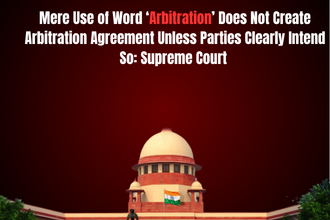Introduction
In a significant ruling reaffirming the principles of criminal jurisprudence, the Supreme Court in Punit Beriwala v. State of NCT of Delhi [2025 LiveLaw (SC) 504] held that the mere institution of civil proceedings does not automatically warrant the quashing of a criminal FIR. This judgment reiterates the well-settled position that the existence of a civil dispute, particularly in commercial transactions, does not preclude criminal prosecution when the allegations disclose cognizable offences like cheating, forgery, and criminal conspiracy.
Background of the Case
The dispute in this case arose out of an agreement to sell property, which later led to a slew of legal proceedings. While civil suits were filed over the contract dispute, cross-FIRs were also registered under Sections 467 (forgery of valuable security), 468 (forgery for the purpose of cheating), 471 (using forged document), 420 (cheating), and 120B (criminal conspiracy) of the Indian Penal Code.
The Delhi High Court quashed the FIR against the appellant, treating the matter as a purely civil dispute stemming from a contractual transaction. However, the complainant appealed to the Supreme Court, arguing that the FIR disclosed serious criminal offences warranting investigation and trial.
Supreme Court’s Observations
The Supreme Court bench comprising Justice Dipankar Datta and Justice Manmohan reversed the Delhi High Court’s order and reinstated the FIR, emphasizing that the mere pendency of civil litigation does not render a criminal case unsustainable.
The Court observed:
“It is trite law that mere institution of civil proceedings is not a ground for quashing the FIR or to hold that the dispute is merely a civil dispute… Simply because there is a remedy provided for breach of contract, that does not by itself clothe the Court to conclude that civil remedy is the only remedy.”
The Court stressed that even if the criminal offence arises out of a commercial transaction, it must still be investigated if the allegations disclose the commission of a cognizable offence. The underlying rationale is to ensure that civil liability is not used as a shield against criminal culpability.
Key Takeaways from the Judgment
- Civil Remedy Not an Automatic Bar to Criminal Action
A breach of contract may give rise to both civil and criminal proceedings if the conduct involves fraudulent intention, deception, or forgery. Courts must look at the substance of allegations to determine whether a criminal offence is made out. - Commercial Nature of Transaction Not a Shield
The Court emphasized that just because an offence was committed during the course of a commercial transaction, it does not mean the matter should only be pursued civilly. Where fraudulent intent is alleged, criminal proceedings must proceed independently. - Prima Facie Cognizable Offences Warrant Investigation
The Supreme Court found that the FIR in question disclosed prima facie commission of cognizable offences like cheating and forgery. As such, the matter deserved investigation and, if necessary, trial. - Reference to Precedents
The Court relied on notable precedents such as:
- Syed Aksari Hadi Ali Augustine Imam v. State (Delhi Admin.) (2009) 5 SCC 528
- Lee Kun Hee v. State of UP (2012) 3 SCC 132
- Trisuns Chemicals v. Rajesh Aggarwal (1999) 8 SCC 686 These judgments reaffirm that the existence of a civil remedy does not bar the invocation of criminal law when ingredients of an offence are prima facie satisfied.
Implications of the Judgment
This ruling will serve as a deterrent to parties who misuse the civil nature of a dispute to avoid criminal liability. It reinforces the idea that criminal law cannot be circumvented simply by initiating civil proceedings. Especially in property and commercial matters where allegations of forgery and fraud are common, this judgment provides clarity on how courts should approach quashing petitions under Section 482 CrPC.
Legal Significance
The judgment is significant for multiple reasons:
- It strengthens the jurisprudence on the interplay between civil and criminal remedies.
- It provides a clear judicial guideline for High Courts dealing with quashing petitions in commercial disputes.
- It prevents the misuse of Section 482 CrPC by ensuring that criminal processes are not stifled on flimsy grounds.
Conclusion
The Supreme Court’s decision in Punit Beriwala v. State of NCT of Delhi reaffirms the principle that a civil dispute and a criminal case can co-exist when the facts support both causes of action. The Court’s reiteration that the presence of civil proceedings is not a ground to quash criminal investigations will have far-reaching effects, especially in commercial and property-related disputes involving allegations of fraud and forgery.
This ruling aligns with the broader public policy objective of ensuring that serious allegations of criminal conduct are not brushed aside merely because a civil suit is pending between the parties. It empowers the law enforcement agencies to carry out investigations uninhibited by parallel civil claims, thereby upholding the rule of law.


